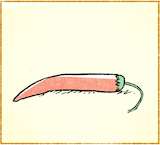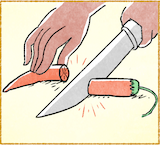


นี้คืออี่หยัง นี้คือบักพิก บักพิกน่วยเดียวข้อหล้อ บักพิกมันมีน่วยเดียว
บักพิกน่วยสีหญัง บักพิกน่วยสีแดง น่วยของบักพิกมันเป็นสีแดง แต่ว่าขั้วนของบักพิกมันเป็นสีเขียว
บักพิกเอาไว้เฮ็ดหญัง บักพิกเอาไว้ถ้าเฮ็ดแนวกิน เอาไว้ถ้าปุงอาหาน หลือไว้ถ้าเอาไว้ถ้าเฮ็ดเป็นแนวกินนั้นหละ
บักพิกมันมีลดซาดเป็นจั่งใด บักพิกลดซาดมันสิเผ็ดๆ เผ็ดคักอี่หลี บางน่วยกะเผ็ดหลาย บางน่วยกะเผ็ดหน้อย
บักพิกญามมันสุกแล้วมันสิเป็นน่วยสีแดง ญามมันดิบอยู่ มันกะสิเป็นน่วยสีเขียว
2
เขากำลังเฮ็ดหญัง เขากำลังหั่นบักพิก
มีคนคนหนึ่ง เขาใซ้มีดหั่นบักพิก เขาเอามีดหั่นลงไปกางน่วยบักพิก หลือว่าหั่นเคิ่งของน่วยบักพิก
เขาสิเอาบักพิกนี้ไปเฮ็ดหญัง เขาอาดสิเอาไปเฮ็ดแนวกิน หลือว่าสิเอาไปปุงเป็นแนวกินนั้นหละ เพื่อว่าสิให้ลดซาดมันมีลดที่จัด หลือว่าลดซาดของแนวกินนั้นเผ็ดๆ ขึ้น
3
เขากำลังเฮ็ดหญัง เขากำลังกัดกินบักพิก
เขากัดกินบักพิกเฮ็ดหญัง จัก จักคือกัน จักว่าเขากินเฮ็ดหญัง เขาอาดสิซิมเบิ่งว่ามันเป็นลดซาดจั่งใด เขากะเลยกัดกินบักพิก
เขากัดกินจั่งใด เขากะเอาบักพิกเข้าปากของเขา แล้วเขากะกัด ใซ้แข้วกัดน่วยบักพิก แล้วเขากะอาดสิซิมเบิ่งว่ามันสิเป็นลดซาดจั่งใด สิเผ็ดบ่ สิหวานบ่
เขากินบักพิกจักน่วย เขาอาดสิกินน่วยเดียว เพาะว่าเห็นอยู่มือของเขาจับบักพิกน่วยเดียวหนึ่ง
Link to overview page
Link to dictionary
| Isaan | Pronunciation | Tones | Thai | English/Notes |
|---|---|---|---|---|
| นี้ | ni: | HF | นี้ | 1. this 2. here |
| คือ | khʉ: | HR | คือ | 1. to be, to resemble, like, as 2. why {บักหล้าคือบ่เก็บโต่ะแน่ = [addressing a young boy] Why haven't you cleared the table?} |
| อี่หยัง | i:-yaŋ | H-M | อะไร | 1. what {นี้คืออี่หยัง = What is this?} {มื้อนี้เจ้าเฮ็ดอี่หยัง = What are you doing today?} {กินเข้างายกับอี่หยัง = What did you have for breakfast?} 2. something, anything, (in negations) nothing {บ่ต้องเฮ็ดอี่หยังอีกเลยนอกจากใส่ปุย = [we] don't need to do anything besides adding fertilizer} |
| บักพิก | bak-phik | M-H | พริก | chili |
| น่วย | nu:ai | H | ลูก, ผล | clf. for the fruits (e.g., banana, coconut, lime, papaya, watermelon), vegetables (e.g., chilis), eggs, mountains, the sun |
| เดียว | di:ao | M | เดียว | only, alone, single |
| ข้อหล้อ | khɔ:-lɔ: | LF-LF | เท่านั้น, ขนาดนั้น, น้อยๆ | only {ต้นไม้มีต้นเดียว ต้นเดียวข้อหล้อ = there's one tree, only one tree} {มีบ้านหลังเดียวข้อหล้อ = there's only one house} |
| มัน | man | HR | มัน | it (also used to refer to people) |
| มี | mi: | HR | มี | 1. to have 2. there is |
| สี | si: | M | สี | 1. color 2. colored pencil, crayon |
| หญัง | ɲaŋ | M | อะไร, เป็นหญัง = ทำไม | 1. what {เขากำลังเฮ็ดหญัง = What is he doing?} {ธูปเอาไว้เฮ็ดหญัง = What are incense sticks for?} 2. something, anything, (nothing) 3. เป็นหญัง[...]คือ in initial position: why {เป็นหญังเขาคือใส่บักพิกลงไปในกวยเตียว = Why is he putting chili in [his] noodle soup?} {เป็นหญังหน้าต่างมันคือเปิด = Why is the window open?} {เป็นหญังมันคือมีควนไฟ = Why is there smoke?} |
| แดง | dɛ:ŋ | M | แดง | red |
| ของ | khɔ:ŋ | M | ของ | of, belonging to |
| เป็น | pen | M | เป็น | 1. to be, to exist 2. to be able to 3. to suffer, sth. happens to 4. เป็นหญัง[...]คือ in initial position: why? {เป็นหญังเขากะคือแปงฟัน = Why is he brushing his teeth?} {เป็นหญังเคี่ยงบินมันคือสิตก = Why is the airplane falling down?} |
| แต่ว่า | tɛ:-wa: | H-H | แต่ว่า | 1. but 2. only {ฮู้แต่ว่าเขายืนอยู่พุเดียว = I only know that he's standing there by himself} |
| ขั้วน | khu:an | LF | ก้าน | stem (of a flower) |
| เขียว | khi:ao | M | เขียว | green |
| เอา | ao | M | เอา | to take, to give {เขากำลังเอาก่องไปซั่ง = he's taking the boxes to weigh them} {หมอกำลังเอายาให้คนป่วยกิน = the doctor is giving medicine to the patient} {เอาไว้ถ้า = is for, is used for, has the purpose of} |
| ไว้ | wai | HF | ไว้ | 1. to keep, to put, to place, to retain, to save, to reserve {เขาเอาหัวของเขาไว้ใส = Where does she put her head?} {หมาสิเลี้ยงไว้บ้าน = dogs are kept/raised in the house} {ไก่เลี้ยงไว้ในคอก = chicken are kept/raised in a coop} {หน้ามันบังไว้ = the face is covered/not visible} {เขาเอาโทละสับวางไว้หู = he holds the phone to his ear} 2. for {นาลิกาปุกมีไว้เฮ็ดหญัง = What is an alarm clock for?} {หม้อเอาไว้เฮ็ดแนวกิน = a pot is used to make food} {ก่องเอาไว้เฮ็ดหญัง ก่องเอาไว้ใส่ของ = What is the box for? It's for putting in stuff.} Notes: see also ไว้ถ้า |
| เฮ็ด | het | H | ทำ | to do, to make |
| ไว้ถ้า | wai-tha: | HF-LF | usually in a positive statement or answer: is for, is used for, has the purpose of {กะทะมีไว้ถ้าทอด = a pan is for frying} {น้ำบักนาวมีไว้ถ้าปุงอาหาน = lime juice is used to season food} {ปากกามีไว้ถ้าเขียน = a pen is for writing} {กะเทียมเอาไว้ถ้าเฮ็ดแนวกิน = garlic is used to make food} {ขาเอาไว้ถ้าญ่าง = legs are for walking} {เกิบเอาไว้ถ้าใส่ = shoes are for wearing} Notes: see also ไว้ |
|
| แนวกิน | nɛ:o-gin | HR-M | อาหาร | food {เฮ็ดแนวกิน = to prepare food} {ตำบักหุ่งเนี้ยกะสิเป็นแนวกิน = papaya salad is (a kind of) food} |
| ปุง | puŋ | M | ปรุง | to season, to flavor, to cook, to mix, to combine {ปุงกาแฟ = to season coffee, i.e., to add sugar} {ปุงกวยเตียว = to season noodle soup (e.g., with chili, fish sauce, vinegar, sugar etc.)} |
| อาหาน | a:-ha:n | M-M | อาหาร | food {ญุงมันกินเลียดเป็นอาหาน = the mosquito feeds on blood} |
| หลือ | lʉ: | M | หรือ | or |
| นั้นหละ | nan-la | HF-M | นั่นแหละ | auxiliary for emphasis at the end of a phrase |
| ลดซาด | lot-sa:t | H-HF | รสชาติ | taste Notes: pronunciation: also realized as ลดชาด |
| จั่งใด | jaŋ-dai | H-M | ยังไง, แบบไหน | how, in what manner {บักนาวมันมีลดซาดจั่งใด = Lime fruits have what kind of taste?} {เขาปิดแอจั่งใด = How is he switching off the A/C?} {เทียนใซ้จั่งใด = How's a candle used?} {สิใซ้จั่งใด = how is [it] used?} |
| สิ | si | M | จะ | future tense auxiliary {เขากำลังสิตื่น = he's about to wake up} {สิไปตะหลาด = [I'm] going to the market} |
| เผ็ด | phet | M | เผ็ด | spicy, hot |
| คัก | khak | H | intensifier: very, very much | |
| อี่หลี | i:-li: | H-M | จริง | intensifier: really Notes: pronunciation: also realized as อี่หลิ |
| บาง | ba:ŋ | M | บาง | 1. some {สัดบางโตบ่มีขา = some animals don't have legs} {บางคนสิมักกินกวยเตียวแทนเข้า = some people like to eat noodle soup instead of rice (dishes)} {บางสิ่งบางอย่าง = something, anything} 2. thin |
| กะ | ga | M | ก็ | 1. then, consequently 2. also |
| หลาย | la:i | M | เยอะ, มาก | many, much, very |
| หน้อย | nɔ:i | LF | น้อย | 1. a little/some 2. not long |
| ญาม | ɲa:m | HR | ยาม | 1. period of time {ญามมื้อเซ้า = morning} {ญามเที่ยง = noon} 2. when, while {ญามทอด ต้องใซ้น้ำมันพ้อม = one needs to use oil when frying} {ญามสิออกไปข้างนอกกะต้องใส่เกิบ = when one goes out, ones has to wear shoes} |
| สุก | suk | M | สุก | 1. ripe 2. to be cooked |
| แล้ว | lɛ:o | HF | แล้ว | 1. finished 2. already 3. and then, and next (especially แล้วกะ) 4. auxiliary for past tense |
| ดิบ | dip | M | ดิบ | raw, unripe |
| อยู่ | yu: | H | อยู่ | 1. to be (located) at 2. yet, still 3. auxiliary indicating continuous or progressive action {ทอดปาอยู่ในกะทะ = (in the process of) frying a fish in the pan} {แม่กำลังเมี้ยนเฮียนอยู่ = mother is cleaning/tidying up the house} |
| เขา | khao | M | เขา | personal pronoun: he, she |
| กำลัง | gam-laŋ | M-HR | กำลัง | auxiliary indicating continuous or progressive action |
| หั่น | han | H | หั่น | to cut, to slice |
| คน | khon | HR | คน | person, people |
| หนึ่ง | nʉŋ | H | หนึ่ง | 1. one 2. after adjective: intensifier {บักคักหนึ่ง = very much} {อันบักใหญ่หนึ่ง = very large}, or attenuates the meaning {กะดาดมันแผ่นน้อยๆ หนึ่ง = the piece of paper is [relatively] small} |
| ใซ้ | sai | HF | ใช้ | to use |
| มีด | mi:t | HF | มีด | knife |
| ลง | loŋ | HR | ลง | 1. to descend, to lower, to go down 2. down 3. bus/train etc.: to get off, to disembark {คนกำลังลงลดบั่ด = people are getting off the bus} 4. boat/ship etc.: to get on, to board {เขากำลังญ่างลงเลีย = he's boarding/getting on the boat} |
| ไป | pai | M | ไป | 1. to go 2. auxiliary indicating action extending into the future |
| กาง | ga:ŋ | M | กลาง | middle, center |
| ว่า | wa: | H | ว่า | 1. that, as {คำว่า X = the word X} 2. to say |
| เคิ่ง | khəŋ | H | ครึ่ง | half {เวลาห้าโมงเคิ่ง = half past five} {เขาบีบบักนาวเคิ่งน่วย = he's pressing half a lime fruit} |
| อาด | a:t | LF | อาจ | 1. might, may, will 2. likely |
| เพื่อ | phʉ:a | H | เพื่อ | for Notes: the vowel เอือ is likely to be a Thai loan; pronunciation: also realized as เพี่ย |
| ให้ | hai | LF | ให้ | 1. to give {หมอกำลังเอายาให้คนป่วยกิน = the doctor is giving the patient medicine} 2. for 3. to allow, to be allowed |
| ลด | lot | H | รส | taste |
| ที่ | thi: | H | ที่ | 1. that, which {คนที่ยืนอยู่ฝั่งขวา = the person which is standing on the right = the person standing on the right} {เว้าคำที่บ่สุพาบ = to speak words which are impolite = to speak impolitely} 2. for ordinal numbers {ที่สาม = third} |
| จัด | jat | M | จัด | intense, strong, concentrated |
| นั้น | nan | HF | นั้น | that, there |
| ขึ้น | khʉn | LF | ขึ้น | 1. to go up, to increase 2. sun: to rise {ตะเว็นกำลังขึ้น = the sun is rising} 3. more 4. bus/train etc.: to get on, to board {พุโดยสานขึ้นลดไฟเบิดแล้ว = all passengers have boarded the train} |
| กัด | gat | M | กัด | to bite |
| กิน | gin | M | กิน | to eat, to consume, to use |
| จัก | jak | M | จัก | 1. answer to a question: [I] don't know, don't know exactly, [I'm] not sure {พุซายคนนี้เขาเถ้าไป่ จัก จักเถ้าหลือบ่เถ้า เบิ่งบ่ค่อยออก = Is this man here already old? I don't know. I can't see clearly whether he's old or not.} {เขาเว้ากันอยู่ใส จักคือกัน = Where are they talking? I don't know either.} 2. exact(ly), what exactly {จักต้มอี่หยังกะบ่ฮู้ = I don't know what (exactly) he is cooking} {บ่ลู้คือกันจักปาอี่หยัง = I don't know either what kind of fish this is} 3. how much/many? {ต้นไม้มีจักต้น = How many trees are there?} {ตอนนี้จักโมงแล้ว = What time is it now?} {มือของเฮานี้สิมีจักนิ้ว = How many fingers do our hands have?} 4. a bit, a little bit {จักหน่อย/จักหน่อยหนึ่ง = a bit, a little bit} |
| คือกัน | khʉ:-gan | HR-M | เหมือนกัน | 1. also, likewise, similarly {ยินดีที่ได้ฮู้จักคือกันคับ = Nice to meet you too!} 2. in negative sentences: either {บ่ลู้คือกัน = I don't know either} {จักคือกัน = I don't know (either)} |
| ซิม | sim | HR | ชิม | to taste, to try |
| เบิ่ง | bəŋ | H | ดู | 1. to look at, to see, to watch {เบิ่งโทละทัด = to watch TV} {เบิ่งหนัง = to watch a movie} 2. to guess {เบิ่งซงแล้ว ... = [I] guess / from what it looks like ...} |
| เลย | lə:i | HR | เลย | 1. futher on, beyond, past {เข็มน้อยเลยเลขสิบสองไป = the minute hand has passed number twelve} 2. too much 3. at all 4. definitively 5. completely, utterly |
| เข้า | khao | LF | เข้า | to enter, to go inside, to come/go in/on {เข้าห้องน้ำ = to go to the bathroom} {เข้านอน = to go to bed} {ขี่เลียเข้าไปเกาะ = to take a boat to go on an island} |
| ปาก | pa:k | LF | ปาก | mouth |
| แข้ว | khɛ:o | LF | ฟัน | tooth {หมามันมีแข้ว = the dog has teeth} |
| บ่ | bɔ: | H | ไม่ | 1. no, not 2. question particle, transforming a statement into a question Notes: spelling exception in line with common usage on social media |
| หวาน | wa:n | M | หวาน | sweet |
| เพาะว่า | phɔ-wa: | H-H | เพราะว่า | because |
| เห็น | hen | M | เห็น | to see |
| มือ | mʉ: | HR | มือ | 1. hand 2. front leg/paw (e.g., of a cat) |
| จับ | jap | M | จับ | 1. to grasp, to hold {เขาจับมือกัน = they're holding hands} {เขายืนจับไอติมอยู่ = she's standing, holding an ice cream} 2. to catch, to arrest {จับพุล้าย = to arrest a criminal} |